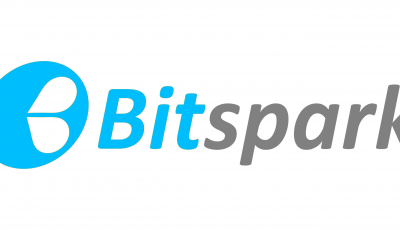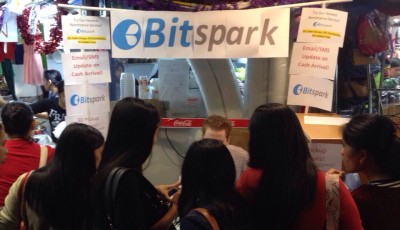Company Profile: Bitspark
 On October 21, Hong Kong-based Bitspark announced the launch of the public beta of its cryptocurrency exchange.
On October 21, Hong Kong-based Bitspark announced the launch of the public beta of its cryptocurrency exchange.
In a press release sent to CoinReport, Bitspark said it “provides the ability for our customers to trade multiple crypto-currencies in a secure, mobile friendly and easy to use environment.” The company said its exchange uses open-source code, has auditable reserves, supports many altcoins, and offers an intuitive API. Bitspark said its commitment to transparency and trust is underscored by its open codebase, cryptographically verifiable audits, and its backing by Cyberport, one of Asia’s largest tech incubators.
Bitspark is the brainchild of George Harrap, an Australian native who told CoinReport in an interview that “literally, about six months ago, I got off the plane to arrive here in Hong King with two suitcases.”
In explaining his company’s genesis, Harrap said he has been a longtime Bitcoiner, having gotten into the digital currency toward the end of 2011.
“I’ve been through all of the different stages that Bitcoiners have been through, if it’s mining, if it’s trading, if it’s lending, if it’s whatever else,” Harrap said.
“I’ve used a number of platforms and I was put off by some of the limitation in these platforms, some of the things I think could be improved upon. That’s why I decided to start Bitspark. Because I think we definitely have something to offer in terms of providing primarily a trustworthy platform that people are willing to invest their money in. But secondly, providing them options. I think, especially at that moment, much of the Bitcoin literature in the market, it’s all in English. S, for us, we want to target a global audience. So I think that’s where the growth in Bitcoins is actually going to come from.”
With a five-member team (four in Hong Kong; one in the Philippines), Bitspark is based out of Cyperport, whose website describes it as “a creative digital community with a cluster of 270+ technology and digital tenants.”
Harrap said Cyberport has an intake of a certain number of startups every three months, and Bitspark was lucky enough to get in and score at the top of the incubator’s latest batch.
“At an incubator, you get 530,000 Hong Kong dollars, in matching funding, you get free office space, you get connections to the mainland, you get different events happening here all the time, networking opportunities,” said Harrap, who said it’s a good place to launch a startup and have support behind your venture, especially if you want to reach into new markets.
Asked if he encountered any obstacles when launching Bitspark, Harrap told CoinReport:
“Well, I think, everyone says regulation, and that is, it’s not as huge of an issue here in Hong Kong. Hong Kong is actually a Bitcoin-friendly regulatory environment. But, in terms of finding banking relationships, that’s a big one. So that’s an ongoing battle, that’s one of the problems in starting a Bitcoin startup, is finding banking partners, finding payment processing partners. People really take an interest in what you’re doing, and understand your business as well. Because it’s too easy to just say, ‘Yeah, we’re not going to take your risk on a Bitcoin company.’ But there are a few out there. So we’ve got to seek out the ones that are providing, are useful in that regard.”
Harrap said there is a big Bitcoin community in Hong Kong, with weekly meet-ups drawing 20 to 30 people, and 500 to 600 people part of a dedicated Facebook group. “It’s usually a revolving door of people that turn up to different meet-ups. It’s a varied client base here in Hong Kong that are interested in Bitcoin.”
Elaborating further on the Bitcoin community in Hong Kong, Harrap said:
“Hong Kong, being a financial hub, obviously there’s a lot of people involved in finance that are interested in Bitcoin. There are many people that work for banks, or perhaps they’re traders. They have a keen interest in Bitcoin as a financial tool. But there’s also people that are perhaps just curious..’what Bitcoin is all about. What can it do? What does it actually mean to you?
I think what we want to do is break the barrier between, you have to know about Bitcoin in order to start using it. What we’re about is trying to build products that you don’t have to explain for ten minutes, before you introduce someone to it. They should just be able to go in and get started right away.”
Harrap noted that “Hong Kong has a large number of overseas foreign workers, and they regularly send money back home to the Philippines and Indonesia very frequently, so that is something that Bitcoin can certainly revolutionize and cut costs for many of these people that are stuck with using banks and Western Union and the like.”
In an email to CoinReport, Harrap said Bitspark’s “priority is the emerging markets of Asia with our focus especially on remittances to the Philippines and Indonesia.” The latter country, in general, is a great market anyway, whether it’s for remittances or for Bitcoin adoption in general, Harrap said, noting a push in Bali of Bitcoin adoption at many of the tourist attractions.
Bitspark wants “to be that trustworthy exchange,” Harrap told CoinReport. “You don’t have to trust that we have your money,” he said about the company’s reserves being 100 percent audible by customers. “You can go and check it yourself. Company incorporation documents are on the website. We have a real address. We’re real people. We’re vetted and backed by one of Hong Kong’s largest incubators.”
Harrap added:
“In terms of trustworthiness, and transparency, what we’re trying to bring across is that we do have the backing of many entities. We try and provide our customers the means to trust that their money is safe with us. That, and we’re looking to bring Bitcoin to new markets. Hong Kong is a good bridge for many different markets in Asia.
Being based in Hong Kong, we can access these markets like the Philippines and Indonesia, and Mainland China. Cyberport actually has an office in Shanghai, which assists incubatees, of which we are one, in setting up in the mainland, going through all of the different regulations that might be involved finding new people on the ground that can assist you, lawyers, there are people like that. So it’s a good place to be based from.”
Bitspark’s exchange launched in limited beta last week with six digital currencies: Bitcoin, Litecoin, Dogecoin, Cloackcoin, Blackcoin, and Peercoin.
Harrap told CoinReport that Bitspark looked to target first the altcoins that were traded in high volume, which was how Cloakcoin, Peercoin, and Blackcoin, the latter of which has a very vocal community, came to be selected.
The company will be adding more coins in the short term (on Tuesday Bitspark added three new coins to its exchange: NuBits, Cannabis Coin, and Darkcoin), and will soon be unveiling a voting system where people can vote for which coin they’d like to see on the exchange. By the end of the year, Harrap said, the Bitspark exchange will have 50 different cryptocurrencies, in addition to at least eight fiat currencies.
“We think some of these coins provide some unique benefits,” Harrap said. “For example, Cloakcoin is more aimed towards the anonymity community. Peercoin was one of the first with a POS algorithm. There’s different uses for all of these different coins. So there’s new ones popping up all the time, so we want to be there to support them from the beginning.”
Bitspark’s existing suite of services includes Spark Pool, a profitability-based coin switching mining pool. Harrap said the company has five coins at the moment in the pool, and when someone mines one of the same algorithm, it will switch to a coin that is most profitable to mine.
Harrap said Bitspark is looking to be an umbrella of different cryptocurrency services, offering an exchange and mining pool along with forthcoming merchant processing and remittance services.
Harrap told CoinReport:
“The standard is pretty low for mining pools right now. Not only in terms of, are they an actual company, are they set up somewhere? Do they hold my money securely? If you’re dealing with a company like Bitspark, we hope that the answer to that question is, ‘Yes, we do trust Bit Spark to hold our money.’ And also, with a mining pool, we can integrate that into our exchange, and offer incentives to people who would trade, who would mine on the mining pool, and then cash out their mining profits on the exchange. So we try and keep everyone within the same ecosystem. At the end of the day, we’re trying to build a better product than the other ones out there. So we think Spark Pool is definitely in the right direction on that.”
Spark Pool is based on Node.js and the exchange on Peatio, both of which are open-source platforms. Open source is the best way to provide transparency, Harrap said.
He added:
“In the case of Mt.Gox, if they were more transparent with what they were doing, perhaps it wouldn’t have unraveled the way it did. We think it’s a good way to build trust. If people can have trust in the platform itself, then people can have trust in what we are doing as a company as well. Because they know it’s based on a solid foundation, it’s vetted by the community. People can have input in the direction of the platform as well. I think it’s a good way to go about things, and it’s something that we’re looking to build upon in the other products that we release.”
Among Bitspark’s objectives is bringing “financial freedom through virtual anyone globally.” CoinReport asked Harrap to describe what financial freedom means to him in this context.
“I think it’s people have the ability to use Bitcoin and cryptocurrency wherever they are in the world, to do stuff with, whether that’s pay for things, whether that’s to invest, whether that’s to send money overseas. I think financial freedom is something that we, perhaps, take for granted in Western countries, which have a fairly developed financial system.
“But there’s many people in many of the emerging nations around the world, which don’t even have a bank account. Perhaps they never will have a bank account. The financial systems are very cloistered. So, I think that Bitcoin, given that many of these emerging nations are growing in smartphone adoption…is a great alternative.”
Harrap considers Bitcoin to be a great technology, and is a firm believer in the ideas behind it, too. He spoke about the Blockchain, which he said can provide a number of service, one which perhaps no one has even thought of before.
“Contracts, for one,” Harrap said. “Making sure that the contract that you sign with someone is time-stamped and then is locked away forever more, but you can easily audit it, if you ever did want to in the future.”
He added:
“I think that’s a very simple application for the blockchain. But I think it’s something, which will grow in the coming years, especially if you can walk into a court and say, ‘Look, the blockchain is the proof that we need.’ I think that’s quite amazing, because you’re making different systems that exist today a lot more efficient. That’s what cryptocurrency is all about. It’s making things more efficient, making things easier to do. Cutting some of the waste as well.”
Harrap said making Bitcoin easy to use in the main thing in terms of getting the digital currency to grow.
“For example, in remittances, I think that’s a huge market for Bitcoin to grow in. People don’t even have to know what’s happening behind the scenes. Big coin is the means of transmission,” said Harrap.
He added:
“If Bitcoin can just happen, and you can present people with a product that utilizes Bitcoin in order to reduce the fees of them sending money overseas, I think that’s going to spread adoption quite rapidly as well. Also, across the board, payments for businesses. For example, Mainland China is a huge one. Mainland businesses getting investment from overseas, or perhaps themselves investing overseas, getting money into China, and getting money out China is very hard. So Bitcoin can massively simplify that, and make it easier for people to move money around. Especially if you’re a business, you’re dealing in larger coins as well, Bitcoin makes sense.”
Harrap, who studied hardware engineering and worked as a logistics manager in Australia, said he thinks he’s approaching Bitcoin “from a different perspective to perhaps some of the people here in Hong Kong [who] are more from a financial background.
He said he thinks Bitspark “can really add value, taking a different angle. I’m not all about the trading, but perhaps some of the other cool techs, the cool applications that you can apply to some of those that are real world problems that you can actually solve right now with Bitcoin. I’ve been in Australia my whole life, and now have moved overseas in order to do this. Hong Kong is a great place to launch a startup. So I’m glad I did it.”
Images courtesy of Bitspark












